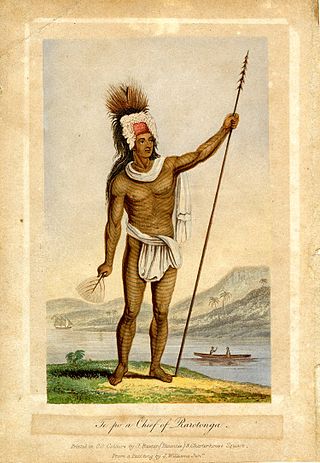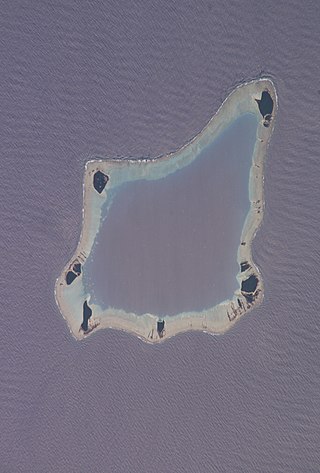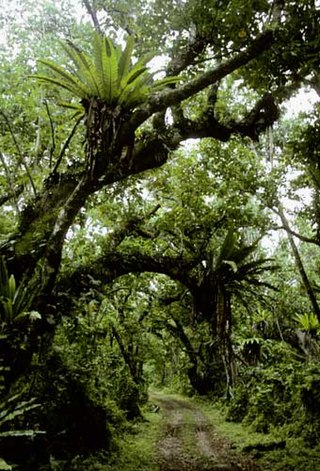
The Cook Islands is a self-governing island country in the South Pacific Ocean in free association with New Zealand. It comprises 15 islands whose total land area is 240 square kilometres (93 sq mi). The Cook Islands' Exclusive Economic Zone (EEZ) covers 1,960,027 square kilometres (756,771 sq mi) of ocean.

The Cook Islands are named after Captain James Cook, who visited the islands in 1773 and 1777, although Spanish navigator Alvaro de Mendaña was the first European to reach the islands in 1595. The Cook Islands became aligned to the United Kingdom in 1890, largely because of the fear of British residents that France might occupy the islands as it already had Tahiti.
This article lists transport in the Cook Islands.

Rarotonga is the largest and most populous of the Cook Islands. The island is volcanic, with an area of 67.39 km2 (26.02 sq mi), and is home to almost 75% of the country's population, with 13,007 of a total population of 17,434. The Cook Islands' Parliament buildings and international airport are on Rarotonga. Rarotonga is a very popular tourist destination with many resorts, hotels and motels. The chief town, Avarua, on the north coast, is the capital of the Cook Islands.

Pukapuka, formerly Danger Island, is a coral atoll in the northern group of the Cook Islands in the Pacific Ocean. It is one of the most remote islands of the Cook Islands, situated about 1,140 kilometres northwest of Rarotonga. On this small island, an ancient culture and distinct language has been maintained over many centuries. The traditional name for the atoll is Te Ulu-o-Te-Watu, and the northern islet where the people normally reside is affectionately known as Wale ('Home').

Palmerston Island is a coral atoll in the Cook Islands in the Pacific Ocean about 290 miles (470 km) northwest of Rarotonga. James Cook landed there on 16 June 1774.

Avarua is a town and district in the north of the island of Rarotonga, and is the national capital of the Cook Islands.
Cook Islands Māori is an Eastern Polynesian language that is the official language of the Cook Islands. Cook Islands Māori is closely related to New Zealand Māori, but is a distinct language in its own right. Cook Islands Māori is simply called Māori when there is no need to disambiguate it from New Zealand Māori, but it is also known as Māori Kūki ʻĀirani or controversially Rarotongan. Many Cook Islanders also call it Te reo Ipukarea, literally "the language of the Ancestral Homeland".

Rarotonga International Airport is the Cook Islands' main international gateway, located in the town and district of Avarua, Rarotonga, 3 km (1.9 mi) west of the downtown area on the northern coast. Originally built in 1944, the airport was expanded in the early 1970s, and officially opened for jets in January 1974.

Survivor: Cook Islands is the thirteenth season of the American competitive reality television series, Survivor. The season was filmed from June 26 to August 3, 2006, and premiered on September 14 of that year. Filmed in the Cook Islands, it was broadcast by CBS.
Rakahanga-Manihiki is a Cook Islands Maori dialectal variant belonging to the Polynesian language family, spoken by about 2500 people on Rakahanga and Manihiki Islands and another 2500 in other countries, mostly New Zealand and Australia. Wurm and Hattori consider Rakahanga-Manihiki as a distinct language with "limited intelligibility with Rarotongan". According to the New Zealand Maori anthropologist Te Rangi Hīroa who spent a few days on Rakahanga in the years 1920, "the language is a pleasing dialect and has closer affinities with [New Zealand] Maori than with the dialects of Tongareva, Tahiti, and the Cook Islands"

The Rarotonga monarch, also known as the Rarotonga flycatcher or kakerori, is a species of bird in the monarch flycatcher family Monarchidae. It is endemic to the Cook Islands.

The Kingdom of Rarotonga, named after the island of Rarotonga, was an independent kingdom established in the present-day Cook Islands in 1858. In 1888 it became a protectorate of the United Kingdom at its own request. In 1893 the name was changed to the Cook Islands Federation.

Achatinellidae is a family of tropical air-breathing land snails, terrestrial pulmonate gastropod mollusks in the superfamily Pupilloidea.
An ariki, ꞌariki, aliki, ali‘i, ari'i, aiki or hakaiki, akariki or ‘eiki (Tonga) is or was a member of a hereditary chiefly or noble rank in Polynesia.

The 2014 Oceania Athletics Championships were held at the BCI Stadium in Avarua, Rarotonga, Cook Islands, between June 24–26, 2014. The event was held jointly with the 2014 Oceania Junior Athletics Championships, and there were also exhibition events for masters, and athletes with a disability (parasports). Detailed reports on a day by day basis were given.
The 2014 Oceania Junior Athletics Championships were held at the BCI Stadium in Avarua, Rarotonga, Cook Islands, between June 24–26, 2014. They were held together with the 2014 Oceania Senior Championships, and there were also exhibition events for masters, and athletes with a disability (parasports). Detailed reports on a day by day basis were given.

The Cook Islands tropical moist forests is a tropical and subtropical moist broadleaf forests ecoregion that covers the Southern Cook Islands in the Cook Islands.

Severe Tropical Cyclone Peni was the first and only tropical cyclone to impact and cause significant damage to the Cook Islands in the 1990 South Pacific cyclone season. A shallow area of low-pressure began to develop near Rakahanga, an island in the Cook Island chain. The storm had also formed on the South Pacific convergence zone. The storm was first recognized on February 12, and had received tropical cyclone characteristics on the 13th. At 21:00 UTC, the storm was recognized as Tropical Cyclone Peni. The storm then took a path southwest towards the Cook Islands, Peni made a narrow turn and passed close to Aitutaki. Peni had gained hurricane status on the 15th, at 06:00 UTC. Peni had been able to keep hurricane characteristics until February 17, when it was downgraded to a storm, and soon, was declared extratropical. The name Peni was retired from the naming list.

The Church of Jesus Christ of Latter-day Saints in the Cook Islands refers to the Church of Jesus Christ of Latter-day Saints and its members in Cook Islands. The first regularly held Sunday meetings began in 1943. In 2022, there were 1,862 members in 5 congregations.














